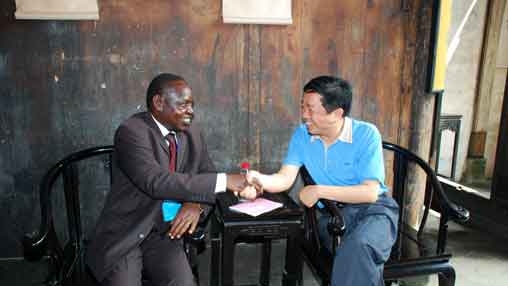Over a year ago, Tadesse Haile, Ethiopia’s Minister of Trade and Industry, attended a workshop in Beijing on Special Economic Zones (SEZ) and Infrastructure Development, followed by a trip to China’s Jiangsu Province where he and other participants visited industrial parks, factories, a food processing company, and irrigation and rural biogas projects.
Now, he and his colleagues have completed the design and the legal framework for developing SEZ in his country. “This is heavily influenced by the Chinese experience,” he said.
Mr. Haile is one of the more than 200 government officials and technical experts from 41 African countries that have participated in a “South-South Knowledge Exchange” program organized by the Chinese government, its African partners and the World Bank.
Since 2008, the ongoing program has delivered a series of events covering various topics: special economic zones, agriculture and poverty reduction, health, vocational education and training, and watershed and land management.
China’s robust economic growth in the past 30 years, which has lifted 600 million people out of extreme poverty, offers lessons for other regions, especially Africa, as the world is closely watching if Africa can become an economic lion beside the Chinese dragon and the Indian tiger.
And the growing economic ties between China and Africa pave the way for experience sharing – Sino-African trade rocketed to $160 billion in 2011, from $2 billion in 1999.
“China’s cooperation with Africa is by no means new. What is new, however, is the level and significance of China’s partnership with Africa,” said Robert Zoellick, President of the World Bank Group. “South-South trade, investment and exchange of know-how can become an important source of growth in the post-crisis era.”
In this sense, this three-party program set out to create a model of experience sharing between countries, organizations and individuals, and to provide opportunities for continued interaction and technical exchange between Africa and Asia.
Inspired Thinking
The program focuses on areas where China’s experience is most relevant for Africa and participants can be most inspired.
For example, in 2008, the program brought 32 policymakers from 18 African countries to China’s inland provinces of Guangxi and Jiangxi where they learned about rural development, as well as the coastal provinces of Guangdong and Zhejiang where they explored investments in infrastructure, township and village enterprises, foreign investment promotion and SEZs.
“I saw first-hand how China has helped farmers,” said Keizire Boaz, an agricultural economist from Uganda, “if the road is paved, the product goes out faster to the market. With electricity, the farmers have radio and television, and are aware of market trends and competitive pricing. It makes a big difference.”
Another participant Andrew Ngone, a Zambia-based advisor for the Common Market for Eastern and Southern Africa said a visit to a vegetable greenhouse gave him insights into how government investment can develop viable private enterprises. “The government provided the initial infrastructure, but the villagers managed it themselves and made it grow to a level where they no longer needed the government support,” he reflected.


